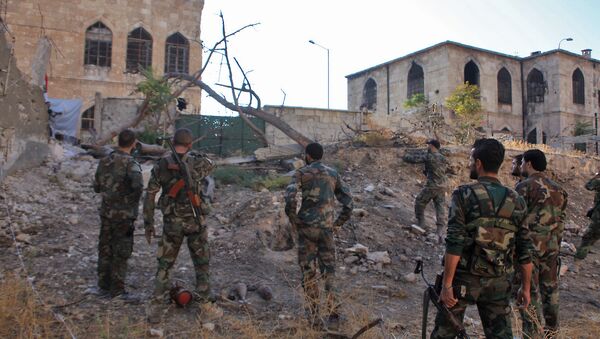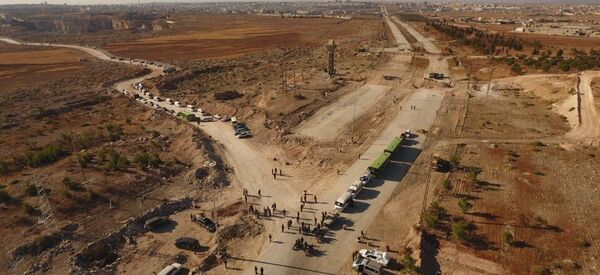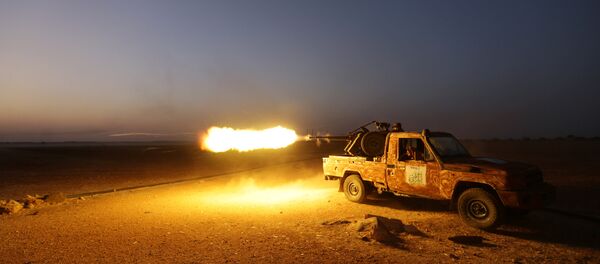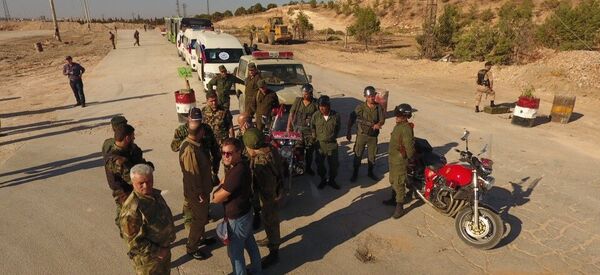On Monday, three people were killed and another 28 wounded after militants from the rebel-held portion of east Aleppo shelled a residential neighborhood in western Aleppo. Earlier, Russian presidential spokesman Dmitri Peskov said that exit points for civilians in the eastern part of the city were subjected to constant attacks during the so-called humanitarian pause in hostilities, while humanitarian agencies were prevented from delivering relief.
Also on Monday, Syrian National Reconciliation Minister Ali Haidar said that militants in eastern Aleppo have refused to leave the city, and have prevented civilians from doing so. The Syrian Air Force has dropped leaflets in the militant-held portions of the city, calling on the militants to make a safe exit or face destruction.
Asked to comment on the resumption of hostilities, political scientist and retired Canadian Armed Forces captain Brad Cabana told Radio Sputnik that it's only a matter of time now before the city is liberated from the jihadists. Unfortunately, he added that "there's probably going to be a lot of destruction and casualties in doing so."
In a situation where militants are deliberately holding up the delivery of aid, and preventing the civilian population from leaving, Cabana stressed the Syrian government really has only two choices: "…you either wait them out, in which case civilians would be essentially starved, or you press on with the assault, and hope for as few casualties as possible. Really, if the rebels aren't prepared to cooperate, these are the only two choices left."
The analyst noted that the civilians in these areas have become the terrorists' only real bargaining chip. "Without those people there, they have no chips. They're completely surrounded. They have no choice but to surrender or be neutralized; they're not going to surrender, so they're essentially saying to Russia, to Syria, that 'if you want to take us, you have to cause casualties to do so.'"
Cabana stressed that the decision to press forward to liberate the city may have been a tough one, "but what is the alternative? The alternative is to allow it to go on and on forever, at which point these people will be starving…"
Asked whether there is any hope for a negotiated solution and to a peaceful surrender of the city, the officer suggested that based on the rebels' penchant for ruthlessness, he just doesn't see that happening, unfortunately.
As far as UU involvement is concerned, including the recent threats in the Washington Post and elsewhere that Washington could begin equipping militants with anti-air missile systems, Cabana suggested that at this point, this is only a warning to Damascus and Moscow. "It's them sending a message to the Russians as well as the Syrians that 'this could still happen if you don't see it our way'. But that's failed the United States and its allies in the past, because they did the same thing in Afghanistan [against the Soviets in the 1980s] through Pakistan, and it came back to bite them, and they've now been in Afghanistan for over twice as long as we fought the Second World War."
Ultimately, Cabana expects that "eventually the Syrian government will take Aleppo, with the help of Russia of course. From there you're going to be seeing a push toward [the jihadists] capital [in Raqqa]. I think unfortunately that the further east the war goes in Syria, you're going to start coming into some conflicts with the United States and the Kurds; there's also the complication of Turkey."
"I would like to say that Syria is a sovereign country, and we lost the memo when we look at it and say 'listen, we have a right to go into a sovereign country and stage our troops there, supply weapons to rebels there.'…It's not respecting international law, and once you break international law, you've really returned us to the law of the jungle, and that's what we're seeing today in Syria…It's very concerning," the analyst concluded.





